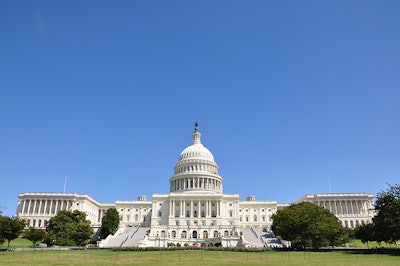
Federal protections for state-legal medical marijuana businesses could expire Friday, Dec. 8, when the federal government is set to run out of money.
The Rohrabacher-Blumenauer amendment (formerly known as the Rohrabacher-Farr amendment) may or may not be included in the new budget bill currently being reviewed by a federal special conference committee consisting of members of various House and Senate appropriations committees.
UPDATE: Federal Marijuana Protections Remain In-Tact for Now
Should it not be included, the Department of Justice (DOJ), under supervision of U.S. Attorney General Jeff Sessions, would be free to prosecute state-compliant medical cannabis businesses.
The Rohrabacher-Blumenauer amendment prohibits the DOJ from using federal tax dollars to interfere with states that have made their own laws regarding the legalization of medical marijuana. The legal memorandum was originally issued by the DOJ in 2013 and sets the policy of non-interference in state laws as long as regulations do not threaten federal priorities like distribution to minors and supporting drug cartels, according to CNN.
‘Cautiously Optimistic’
Despite some uncertainty surrounding the bill and the Rohrabacher-Blumenauer amendment, especially considering the Attorney General’s outspokenness against marijuana, Morgan Fox, director of communications for Marijuana Policy Project (MPP), is optimistic that the amendment will pass.
“Since the conference committee meetings happen behind closed doors, there is no way to tell what is being considered and who is fighting for inclusion at this point,” Fox said. “However, I think there is a good chance that it will be included, given that it has been renewed every year since it first passed in 2014.”
The amendment was renewed in May under the current administration as part of a spending bill.
NORML Political Director Justin Strekal noted that the amendment has bipartisan pressure and support, and he believes what will likely happen on Dec. 8 is the passage of a continuing resolution (CR) that will provide more time to finalize the deal.
“If they pass a CR, then it just continues those protections until the next CR would expire,” Strekal said.
U.S. Senator Patrick Leahy (D-VT) introduced the amendment in the Senate, Fox said, and it was approved in a voice vote. Representatives Dana Rohrabacher (R-CA) and Earl Blumenauer (D-OR) introduced the provision in the House, but it was ruled out of order by the House Rules Committee Sept. 6, which prevented it from coming to a vote on the House floor.
“On the Senate side, where it was included, … it passed by a voice vote this year, [and] this is the first time that [has] ever happened on the Senate side, which meant that no senator on the appropriations committee felt so strongly against the amendment that they felt the need to make sure that the vote was recorded to have them on record as being opposed to it, which is a positive sign as far as us progressing the political dialogue regarding this process,” Strekal said.
There was also support in the Senate for the Veterans Equal Access amendment, Strekal added, which would allow veterans in states with medical cannabis programs to discuss medical marijuana as a treatment option with their doctors, who could then recommend cannabis to veterans for medicinal purposes. This is encouraging for the industry, Strekal said, and could be an indication of support for the Rohrabacher-Blumenauer amendment.
On Sept. 8, the federal protections for medical marijuana businesses were extended for three months as part of the passage of a bill to extend the federal debt ceiling. The inclusion of the provision in the spending package did not reverse the House’s decision to remove it from its budget bill, however, and it remains uncertain whether it will be included in the final version of the legislation. The protections must be reauthorized by Congressional leadership Dec. 8 as part of the forthcoming budget to remain in effect.
The Senate and the House will need to reconcile their different versions of the appropriations budgets via the conference committee, Fox said.
“They will determine what elements to keep from both the House and Senate Appropriations budgets,” he said.
“It comes down to eight lawmakers,” Fox added.
“At the end of the day, it’s going to be Congressional leadership sitting in a room, and they’re going to be looking at what’s different and what’s not, and given the support, given the advocacy that we’ve seen coming from the left, right and center in supporting the continuation of this very simple policy, I’m cautiously optimistic that it will be included,” Strekal added.
Congressional Efforts and DOJ’s Stance
Sixty-six members of Congress have sent a letter to House Speaker Paul Ryan, Senate Majority Leader Mitch McConnell, House Minority Leader Nancy Pelosi and Senate Minority Leader Chuck Schumer to urge them to keep federal protections for the 46 states that have implemented medical cannabis programs, according to NORML’s website.
Attorney General Jeff Sessions said Nov. 29 that the DOJ was analyzing ways to work toward a “rational” marijuana policy, CNN reported. Sessions did not elaborate, but noted that he views marijuana as “detrimental” and that consumption is still illegal under federal regulations.
The DOJ and Attorney General do not have any final say in the federal appropriations budget, Fox noted, although they could affect the industry in other ways.
“National politics has been fairly unpredictable, and there are several things the DOJ could do that would have a negative impact on patient access and future progress that don’t have as bad of optics as widespread SWAT raids,” Fox said. “For instance, they could send letters to landlords of marijuana businesses threatening asset forfeiture if they continue to rent to their current clients, or go after ancillary businesses.”
This kind of federal crackdown could create fear for the industry, patient involvement and further reform in states that do not yet have effective medical marijuana programs, Fox added.
Efforts Toward Federal Legalization
Should the amendment be dropped from the final appropriations budget, Fox said businesses can best protect themselves by lobbying to Congress to make a permanent change to federal law.
“It has long been established that the federal government has the legal right to enforce federal law in the states,” Fox said. “This amendment merely does not allow the DOJ to use any resources to do so in the case of individuals or businesses that are in compliance with state law. I think the best way businesses can protect themselves is to lobby Congress to make a permanent change similar to what this amendment does, so that it doesn’t have to be renewed every year in Appropriations.”
State-legal cannabis businesses should also make every effort to be in compliance with state law, Fox added, so that if the DOJ does start cracking down, they will have nothing to scrutinize.
Strekal agreed that the best way for cannabis businesses to protect themselves is for marijuana to be de-scheduled from the Controlled Substances Act, and noted that although the Rohrabacher-Blumenauer amendment protects medical marijuana businesses, there are no federal protections for adult-use businesses.
“If Rohrabacher-Blumenauer is not reauthorized, then it’s just going to increase the necessity that advocates and industry stay ever more vigilant and continue to press forward to build the political power needed to end marijuana prohibition once and for all,” he said.
Top image: © María Esther Calvo Sodric | Dreamstime.com


























